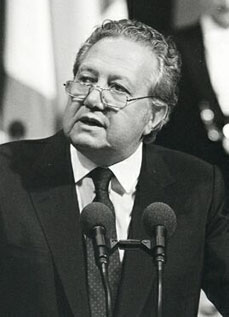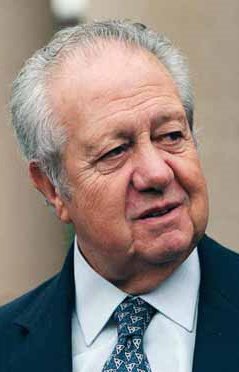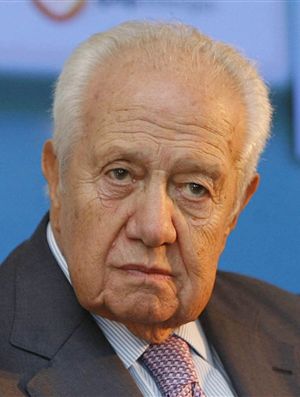<Back to Index>
- President of Portugal Mário Alberto Nobre Lopes Soares, 1924
PAGE SPONSOR



Mário Alberto Nobre Lopes Soares, GColTE, GCC, GColL, KE (7 December 1924 - 7 January 2017), Portuguese politician, served as Prime Minister of Portugal from 1976 to 1978 and from 1983 to 1985, and subsequently as the 17th President of Portugal from 1986 to 1996.
Soares was the son of João Lopes Soares (Leiria, Arrabal, 17 November 1878 - Lisbon, Campo Grande, 31 July 1970), Founder of the Colégio Moderno in Lisbon, Minister and then anti - fascist republican activist who had been a Priest for some time before marrying Elisa Nobre Baptista (Santarém, Pernes, 8 September 1887 - Lisbon, Campo Grande, 28 February 1955), Mário Soares's mother, at the 7th Conservatory of the Civil Register of Lisbon on 5 September 1934. His father also had another son by an unknown mother named Tertuliano Lopes Soares. His mother had previously been married and had two children, J. Nobre Baptista and Cândido Nobre Baptista. Mário Soares was raised as a Roman Catholic, but came to identify himself as a laic, agnostic and atheist.
Soares was born in Lisbon, Coração de Jesus, and graduated in History and Philosophy from the University of Lisbon. He became a university lecturer in 1957, but his activities in opposition to the dictatorship of António de Oliveira Salazar led to repeated arrests. He was active in resistance groups such as the Movement for Anti - Fascist National Unity and the Movement for Democratic Unity.
Soares began his studies at Colégio Moderno, owned by his father. There, for a short period he was taught Geography by Álvaro Cunhal, who would later became the towering figure of Portuguese Communism and one of Soares' greatest political rivals.
While a student at University, Soares joined the Portuguese Communist Party, being responsible for the youth section. In this capacity, he organized demonstrations in Lisbon to celebrate the end of WWII. He was first arrested by PIDE, the Portuguese political police, in 1946, when he was a member of the Central Committee of the Movement of Democratic Unity (Portuguese: Movimento de Unidade Democrática), at the time chaired by Mário Azevedo Gomes. Soares was arrested twice in 1949. On those latter occasions, he was the secretary of General Norton de Matos, a candidate for the Presidency. However, he became estranged from Norton de Matos, when the latter discovered Soares's Communist sympathies.
Soares married Maria de Jesus Barroso Soares, an actress, in 22 February 1949, while in the Aljube prison, at the 3rd Conservatory of the Civil Register of Lisbon. They have a son, the former Lisbon Mayor João Soares, and a daughter, Isabel Barroso Soares, b. 1951, who manages the Colégio Moderno.
Soares's multiple arrests for political activism made it impossible
for him to continue with his career as a lecturer of history and
philosophy. Therefore, he decided to study law and become an attorney.
In 1958, Soares was very active in the presidential election supporting General Humberto Delgado. Later, he would become Delgado's family lawyer, when Humberto Delgado was murdered in 1965, in Spain, by agents of the dictatorship's secret police (PIDE).
In April 1964, in Geneva, Switzerland, Soares together with Francisco Ramos da Costa and Manuel Tito de Morais created the Acção Socialista Portuguesa (Portuguese Socialist Action). At this point he was already quite distant from his former Communist friends (having quit the Communist Party in 1951); his views were now clearly inclined to economic liberalism.
In March 1968, Soares was arrested again by PIDE, and a military tribunal sentenced him to banishment in the colony of São Tomé in the Gulf of Guinea. His wife and two children, Isabel and João, accompanied him. However, they returned to Lisbon eight months later for in the meantime dictator Salazar had been replaced by Marcello Caetano. The new dictator wanted to present a more democratic face to the world, so many political prisoners, Soares among them, were released.
In the 1969 general election, which was rigged, the democratic opposition (whose political rights were severely restricted) entered with two different lists. Mário Soares participates actively in the campaign supporting the Coligação Eleitoral de Unidade Democrática or CEUD (Electoral Coalition for Democratic Unity). CEUD was clearly anti - fascist, but they also reaffirmed their opposition to Communism.
In 1970, Soares was exiled to Rome, Italy, but eventually settled in France where he taught at the Universities of Vincennes,
Paris and Rennes. In 1973, the Portuguese Socialist Action became the
Socialist Party, and Soares was elected Secretary - General. The
Socialist party was created under the umbrella of Willy Brandt's SPD in
Bad Münstereifel, Germany, on 19 April 1973.
On 25 April 1974, elements of the Portuguese Army seized power in Lisbon, overthrowing Salazar's successor, Marcelo Caetano. Soares and other political exiles returned home to celebrate what was called the "Carnation Revolution."
In the provisional government which was formed after the revolution, led by the Movement of the Armed Forces (MFA), Soares became minister for overseas negotiations, charged with organizing the independence of Portugal's overseas colonies. Among other encounters, he met with Samora Machel, the leader of Frelimo, to negotiate the independence of Mozambique.
Within months of the revolution however, it became apparent that the Portuguese Communist Party,
allied with a radical group of officers in the MFA, was attempting to
extend its control over the government. The Prime Minister, Vasco dos Santos Gonçalves,
was accused of being an agent of the Communists and a bitter
confrontation developed between the Socialists and Communists over
control of the newspaper República.
Democratic government was finally established when national elections were held in April 1976. The Socialists won a plurality of seats and Soares became Prime Minister. But the deep hostility between the Socialists and the Communists made a left wing majority government impossible, and Soares formed a weak minority government. Vast fiscal and current account deficits generated by previous governments forced Soares to adopt a strict austerity policy, which made him deeply unpopular. Soares had to resign from office after only two years, in 1978.
The wave of left wing sentiment which followed the 1974 revolution
had now dissipated, and a succession of conservative governments held
office until 1983, when Soares again became Prime Minister, holding
office until late 1985. His main achievement in office was negotiating
Portugal's entry into the European Economic Community. Soares almost
single - handedly turned public opinion around, for Portugal at the time
was very wary of integration into the EEC.
In the Portuguese presidential election, 1986, held in March, Soares was elected President of Portugal, beating Diogo Freitas do Amaral by little more than 2%. He was reelected in 1991, this time with almost 70% of the vote. For most of Soares' two terms of office, Portugal was governed by the centre right Social Democratic Party, led by Aníbal Cavaco Silva.
He devised the so-called Presidência Aberta (Open Presidency), a series of tours around the country, each addressing a particular issue, such as the Environment
or a particular region of Portugal. Although generally well received by
the public, some claimed that he was criticizing the government and
exceeding his constitutional role. Others stated that the tours were in
the style of medieval courts. Yet the name stuck for today's
presidential initiatives of the same type.
- Soares retired in 1996, but in 1998 he headed the Independent World Commission on the Oceans.
- In 1999 he also headed the Socialist ticket in elections to the European Parliament, where he served until the 2004 elections. He ran for President of the Parliament, but lost to Nicole Fontaine.
- In 2000 he was awarded the North - South Prize.
- In March 2005, he launched a petition urging the European Union to start membership talks with Cape Verde.
- On 30 August 2005, he announced his candidacy to run for President in the election that occurred in 22 January 2006, when he was 81 years old. However, he lost the election to Aníbal Cavaco Silva and was even behind Manuel Alegre, receiving 14% of the vote. "The results went against my expectations. I accept this defeat with a feeling of mission accomplished, [...]" he said, conceding defeat. It was suggested (in RTP1 TV-Program Prós e Contras, in March 2008), that one of the reasons for the weak vote could be the Portuguese were reluctant to elect any President for more than 2 terms (only allowed by the Portuguese Constitution of 1976 if non - consecutive).
- In the TV-program Os Grandes Portugueses (English: The Greatest Portuguese), he was voted 12th, the highest placed among living people chosen by the public. Dictator António de Oliveira Salazar would eventually win.
- He was also a member of the strongest Masonic lodge of Portugal.
- He was president of the Fundação Mário Soares (Mário Soares Foundation).
- He sat in the board of Directors of the Fundação Oriente.
- He was a Member of the Portuguese Council of State, as a former elected President of Portugal.
After the general elections of Finland, 17 April 2011, Mário Soares, expressed an opinion according to which Finland has changed into a extremely conservative country, where solidarity is unknown. Soares recalled the memory of Kalevi Sorsa
contrasting his generosity with the dwarfs who wanted to rule
Finland, their ethical values and their hostility against Portugal.
According to Soares the Finns lived in illusion believing that
speculative markets and credit criminals can destroy nations with nine hundred years of independent history.
Soares died on 7 January 2017 at the aged 92. He had been admitted to the hospital on 13 December, and although his condition at first showed slight signs of improvement, he lapsed into a coma on 26 December from which he never recovered. The Portuguese Government offered a state funeral and declared three days of national mourning. After lying in state at Jerónimos Monastery during 9 January, his remains were transported to Prazeres Cemetery the next day, and now lie at the family vault next to his wife.